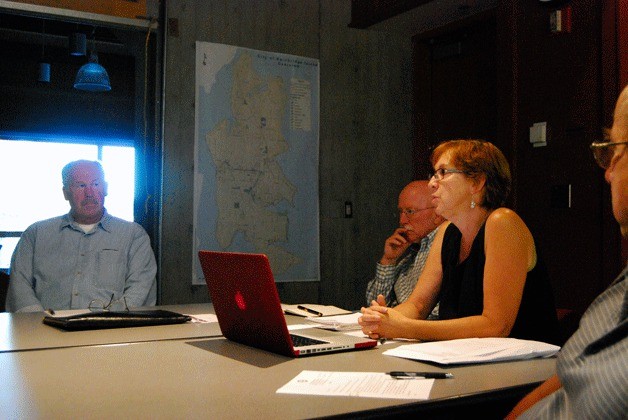In last week’s meeting, the Utility Advisory Committee decided to delete public comment from the agenda and considered suspending all upcoming meetings until they have been briefed on the Open Public Meetings Act.
It was the first meeting run by UAC Chairwoman Arlene Buetow since her involvement in a public records lawsuit against the city. The city was sued by two government watchdogs after they discovered missing emails exchanged between Buetow and a majority of the council.
Buetow suggested that last’s weeks UAC meeting should be the last until the group has spoken with the city’s attorney.
“We don’t want to have any further meetings until we get advice from the city attorney on our rights and responsibilities on how we are to operate as an organization,” Buetow said during the meeting.
Buetow, who was recently named as a key player in the private email correspondence between four council members, defended the idea of deleting public comment when committee member Eric Turloff brought the discussion forward at the start of the meeting.
Turloff — who has also been a constant email advisor behind the scenes to several members of the council — explained that when he joined the group more than a year ago, he asked if they were bound by state law that mandates public meetings. He said he was advised that they were not.
However, since changes in city staff, Turloff said he was recently notified by the city manager that the group, in fact, falls under the Open Public Meetings Act and is being held accountable. The city attorney also made similar comments during a recent city council session.
“It said that the real thing that they’re hanging their hat on is the fact that we take public comment,” Turloff said.
So, he requested the group delete public comment from the agenda so they may not fall under the act for the current meeting.
He was met with mixed responses from the committee and the few citizens in attendance.
“From the very beginning, we always made sure that people who took the time to come had the opportunity to comment,” said committee member Andy Maron.
“I have no problem with you asking the city manager for some question about, ‘What if we delete the public comment section from our agenda.’ But I don’t want to delete it today,” Maron added.
Committee member Doug Dow added that although he could support deleting public comment for the day, as most people knew how to get in touch with the committee via email, he disagreed with suspending their upcoming meetings.
“[The] Open Public Meetings Act, all it requires is that there be public notice in time enough for people to know …” Maron started.
He did not get far before Buetow interrupted.
“Andy, I don’t want you to be the person to advise us on what’s required. I want the city’s counsel.”
The UAC is required to keep its meetings open to the public, regardless of whether public comment is accepted, however. According to the committee’s ordinance and municipal code, UACs meetings must be open to the public, the group must keep a record of its meetings, resolutions, transactions, findings and determinations, and they must have a quorum of at least four members.
At last week’s meeting, Buetow turned to the two residents who attended the meeting during the debate and asked if they had objections to deleting public comment for the day.
Robert Dashiell said that he knew how to get his comments to the group regardless.
She then asked Bill Knobloch if he objected.
“Not really, but I think that when you make public comment like this about if there’s no public comment …” Knobloch began.
“Just a second, you’re making public comment. We don’t want …” Buetow attempted to interrupt.
“Where is the legal citation for this? People make comments without any reference to the legality,” Knobloch said as he managed to speak over her.
He finally said, “I have no choice as an observer.”
At one point the committee questioned whether having a meeting under the Open Public Meetings Act could mean the city could show up at one of their homes and take their computer.
Maron said no.
“I can tell you, the Open Public Meetings Act and the Open Public Records Act are completely different laws,” Maron said.
“OK, then we would like the city attorney to tell us that,” Buetow responded. “We saw the presentation that said that if we’re subject to the Open Public Meetings Act, we are thereby subject to the Public Records Act. And I don’t know, Andy. I’m not an attorney, you are.”
The public comment portion of the agenda was deleted from last week’s meeting, but the committee is not likely to get a briefing from city staff on the Open Public Meetings Act, City Manager Doug Schulze said this week.
“With the impending lawsuit, we won’t be looking at doing any briefings until that has been resolved,” Schulze said.
The original version of this story contained an inaccuracy that has been corrected. The original story implied the UAC had voted to suspend meetings until it received a briefing from the city on the Open Public Meetings Act; it did not vote on that issue.



